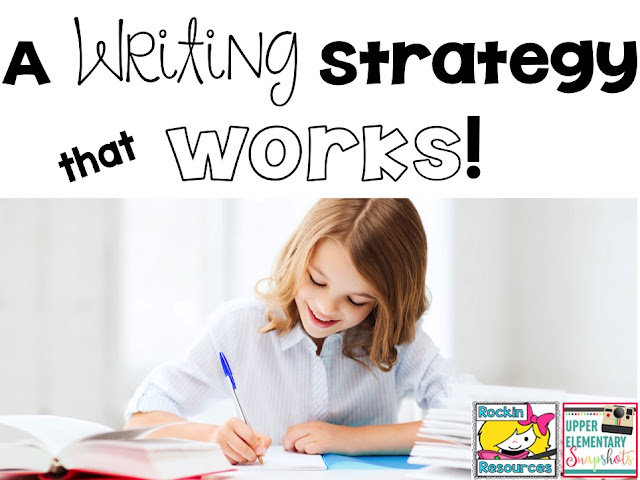"I have used your ideas for several years and find this writing strategy effective in my fourth grade classroom. It helped motivate my students to grow into amazing writers and made them proud of their work. Using a scaffolding approach to writing is genius! Thank you for your ideas!"- a veteran teacher.
Being a writing coach, I come across teachers who question the effectiveness of their writing lessons. I have no doubt that they are good teachers, they just need a guide to teaching the fundamentals of writing in an ORDER that makes sense. With that in mind, I would like to share a writing strategy that really works! You will find a step-by-step approach that has mini lessons in an order designed so each lesson builds upon the previous one.
To begin the year, upper elementary students need a review of sentence structure. This foundation will be helpful in all future writing assignments.
A. Subjects/Predicates
B. Fragments
C. Complete Sentences
D. Run-Ons
E. Compound Sentences
Next, upper elementary students need a good understanding of paragraph elements, which will be especially useful when teaching essay writing.
A. Topic Sentences
B. Relevant Details
C. Closing with Clinchers
D. Hamburger Model
Before you begin introducing types of writing, spend time explaining the writing process and expect them to use it EVERY time they write an essay!
A. Prewriting
B. Rough Draft
C. Revise
D. Edit
E. Peer Editing
F. Final Copy

Teach narrative writing as your first writing piece of the year. It works well because it covers so many writing skills that are not needed in other types of writing. (Ex. character traits, dialogue). When teaching lessons for this first writing piece, choose a prompt and follow lessons A-Z using the same prompt. It will take several weeks, but don't get discouraged! Students will begin to see their writing develop into a beautiful piece of writing. I found it also effective to allow students to partner up for this first piece of writing.
A. Narrative Writing Elements
B. Prewriting-Brainstorming
C. Task, Audience, PurposeD. Graphic Organizers
E. Introduction (Character, Setting, Plot)
F. Body (Power of 3, Suspense, Climax)
G. Character Traits-Developing Character
H. Dialogue
I. Conclusions
J. Rough Draft L'AmourK. D.A.R.E. to Revise (explain revising)
L. Delete
M. Add (Transition Words)
N. Add (Million Dollar Words)-can also use with exchange.
O. Rearrange
P. Exchange (Sentence Variety)
Q. Exchange (Jammin Conclusions)
R. Exchange (Crafty Title)
S. C.U.P.S. (explain editing)
T. Capitalization
U. Usage
V. Punctuation
W. Spelling
X. Peer Reflection
Y. Final Copy
Z. Share
After this first essay is completed, then move onto other types of writing and use the narrative lessons as a resource! This step-by-step approach provides students with a solid understanding of how to build a quality piece of writing!
***To teach these lessons, I suggest you model examples. Other essential teaching tools: Provide an anchor chart, mentor text, practice, and opportunity to take notes for each mini lesson.
***To teach these lessons, I suggest you model examples. Other essential teaching tools: Provide an anchor chart, mentor text, practice, and opportunity to take notes for each mini lesson.
As promised, download the FREE WRITING PACING GUIDE HERE! The mini lessons for sentence structure, paragraph writing, narrative writing, opinion writing, and informative writing are in a scaffolding order with opportunities for review and extra practice.
"Start writing no matter what. The water does not flow until the faucet is turned on." -Lewis L'Amour
Connect With Me!








